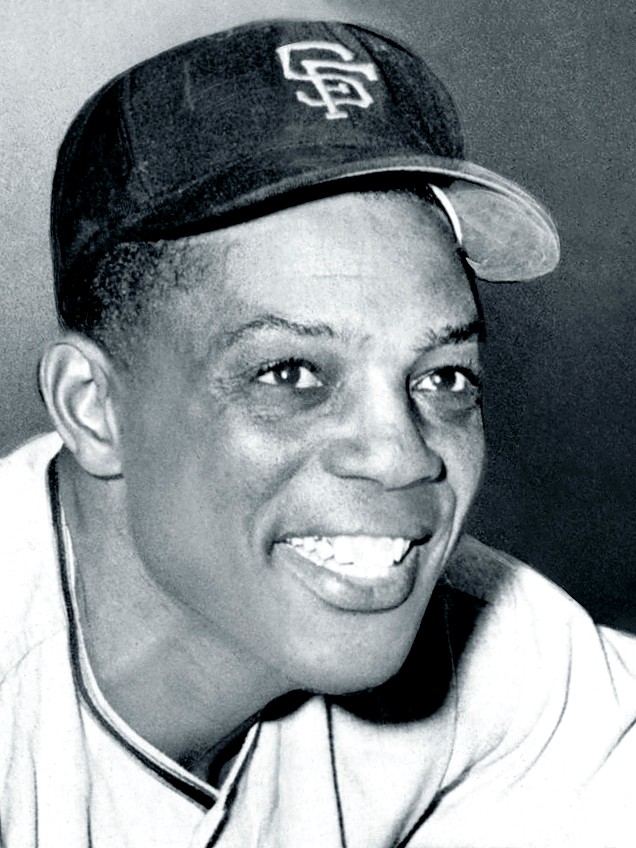Willie Mays
 Willie Howard Mays Jr. (May 6, 1931 – June 18, 2024), nicknamed "the Say Hey Kid", was an American professional baseball center fielder who played 23 seasons in Major League Baseball (MLB). Widely regarded as one of the greatest players of all time, Mays was a five-tool player who began his career in the Negro leagues, playing for the Birmingham Black Barons, and spent the rest of his career in the National League (NL), playing for the New York / San Francisco Giants and New York Mets.
Willie Howard Mays Jr. (May 6, 1931 – June 18, 2024), nicknamed "the Say Hey Kid", was an American professional baseball center fielder who played 23 seasons in Major League Baseball (MLB). Widely regarded as one of the greatest players of all time, Mays was a five-tool player who began his career in the Negro leagues, playing for the Birmingham Black Barons, and spent the rest of his career in the National League (NL), playing for the New York / San Francisco Giants and New York Mets.Born in Westfield, Alabama, Mays was an all-around athlete. He joined the Black Barons of the Negro American League in 1948, playing with them until the Giants signed him upon his graduation from high school in 1950. He debuted in MLB with the Giants and won the Rookie of the Year Award in 1951 after hitting 20 home runs to help the Giants win their first pennant in 14 years. In 1954, he won the NL Most Valuable Player (MVP) Award, leading the Giants to their last World Series title before their move to the West Coast. His over-the-shoulder catch in Game 1 of the 1954 World Series is one of the most famous baseball plays of all time. After the Giants moved to San Francisco, Mays went on to win another MVP Award in 1965 and also led the Giants to the 1962 World Series, this time losing to the New York Yankees. He ended his career with a return to New York after an early season trade to the New York Mets in 1972, retiring after the team's trip to the 1973 World Series. He served as a coach for the Mets for the rest of the decade before rejoining the Giants as a special assistant to the president and general manager.
Mays was an All-Star 24 times, tying for the second-most appearances in history. He led the NL in home runs four times and in slugging percentage five times while batting over .300 and posting 100 runs batted in (RBI) ten times each. Mays was also at the forefront of a resurgence of speed as an offensive weapon in the 1950s, leading the league in stolen bases four times, triples three times, and runs twice; his 179 steals during the decade topped the major leagues. He was the first NL player to hit 30 home runs and steal 30 bases in the same season, the first player in history to reach both 300 home runs and 300 stolen bases, and the second player and the first right-handed hitter to hit 600 home runs. Mays also set standards for defensive brilliance, winning 12 consecutive Gold Glove Awards after their creation in 1957, still a record for outfielders; he led NL center fielders in double plays five times and assists three times.
A classic example of a five-tool player, Mays finished his career with a .302 batting average. At the time of his retirement, he held the NL record for career runs scored (2,062), and ranked second in league history behind Stan Musial in games played (2,992), third in home runs (660), at bats (10,881), runs batted in (1,903), total bases (6,066), extra-base hits (1,323) and walks (1,464), fourth in hits (3,293), fifth in slugging percentage (.557), and eighth in doubles (523); his 140 triples ranked fourth among players active after 1945. He holds major league records for games as a center fielder (2,829), putouts as an outfielder (7,095), and ended his career behind only Ty Cobb in total games as an outfielder (2,842), ranking seventh in assists (188) and third in double plays (59) in center field. Mays was elected to the Baseball Hall of Fame in 1979 in his first year of eligibility, and was named to the Major League Baseball All-Century Team in 1999. Mays was awarded the Presidential Medal of Freedom by President Barack Obama in 2015. Provided by Wikipedia
